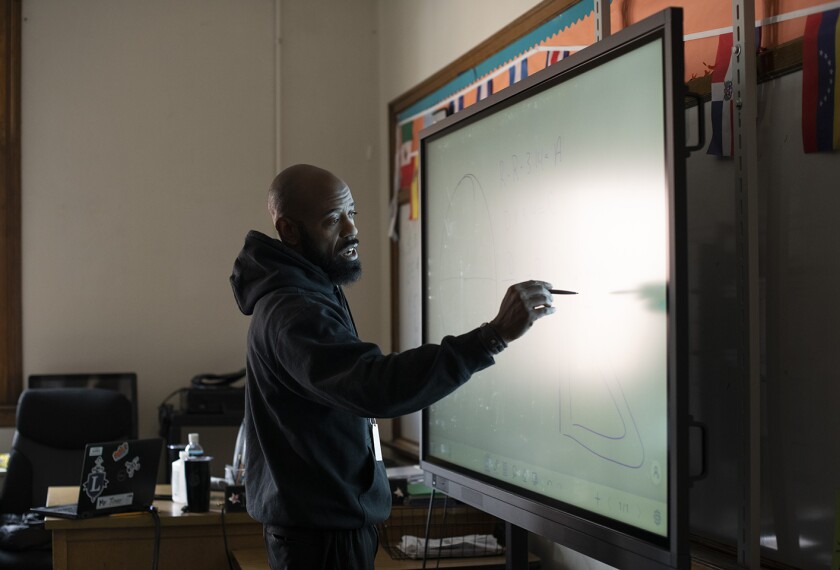This content was created by the independent, nonprofit, nonpartisan EdWeek Research Center and commissioned by Merrimack College. The content contained herein does not reflect endorsements of Merrimack College by Editorial Projects in Education or our publications.
As teachers grapple with the fallout of a worldwide pandemic and renewed attention to the culture wars in schools, their satisfaction rates appear to have hit an all-time low, according to the first annual Merrimack College Teacher Survey commissioned by the Winston School of Education and Social Policy at Merrimack College and conducted by the nonprofit, nonpartisan EdWeek Research Center.
The survey results suggest a deep disillusionment of many teachers who feel overworked, underpaid, and under-appreciated, with potential implications for a once-in-a-generation shift in the teaching profession. For example, just 12 percent of teachers, the survey found, are very satisfied with their jobs, with more than four in ten teachers saying they were very or fairly likely to leave the profession in the next two years.
This yearly survey fills the gap left by MetLife’s former Survey of the American Teacher, which asked similar questions to gauge the state of the teaching profession and highlight teacher voices and perspectives. The Merrimack College Teacher Survey was of 1,324 of the nation’s teachers and conducted between January 9th and February 23rd, 2022, and has a margin of error of plus or minus 3 percentage points with a 95 percent confidence level.
The last two years have been fraught for teachers as their profession has consistently attracted public attention—much of it hostile—due to political and cultural battles over pandemic-related policies on masking and vaccines and new laws curtailing instruction related to race, racism, and gender.
A factor that almost certainly contributes to their rising dissatisfaction is teachers’ growing perception that the general public does not understand or appreciate their work. Less than half of 2022 survey respondents say the general public respects them and views them as professionals, down from 77 percent of 2011 respondents to the MetLife survey.
Most teachers also perceive that five of seven timely topics included on the survey receive insufficient attention from the news media. However, like other Americans, they are divided along partisan lines, especially when it comes to issues of racism and race: While 54 percent of teachers who traditionally vote for the Democratic party say that teaching about racism and race should get more attention from the news media, just 15 percent of self-identified Republicans agree.
Salaries may be another reason so many teachers are dissatisfied. Twenty-six percent of teachers say they are paid fairly for the work they do, down from 35 percent on MetLife’s 2011 survey. Teachers with three to nine years in the classroom and females are more likely to say their salaries are unfair, as are teachers who are dissatisfied with their jobs and those who are likely to leave the profession in the next two years.
Autonomy is another indicator of satisfaction. While most teachers say they have control over key aspects of their jobs—including their teaching/pedagogy, their curriculum, their students’ classroom behavior, the way that they assess their students, and the resources and supplies they need for instruction—just 37 percent say they have a lot of influence over another critical area: scheduling.
The typical teacher works 54 hours per week, 25 hours of which is spent teaching students. Although the amount of time spent teaching is relatively consistent across categories such as grade level and years of experience, Black teachers and teachers in majority-Black schools report working longer hours and spending less of them on instruction.
Overall, most teachers say they’d like to spend more time on activities directly related to teaching (planning, instruction) and less time on more ancillary tasks (administrative work, non-teaching student interactions such as hall duty, mentoring, and counseling). This sense—that too much time is spent on this more peripheral work, combined with the reality that most teachers say they lack control over their time and nearly half perceive they lack control over the curriculum they teach—raises concerns that teaching is becoming a deprofessionalized job, one where educators are treated more and more like hourly employees with limited autonomy.
The challenges and frustrations that teachers face could take a toll on the profession’s ability to sustain itself in the future. Forty-four percent of teachers say they are very or fairly likely to leave the profession in the next two years, up from 29 percent in the 2011 MetLife survey. Women, Black teachers, teachers working in Southern states, and teachers with three to nine years of experience are significantly more likely to say they plan to leave education. It’s important to note that based on current research, it is unclear whether such intentions will translate into higher actual attrition rates in this and coming school years.
Given the challenges they face, would teachers advise their younger selves to do it all again? On this, educators are split, with less than half (45 percent) saying they would and the remainder saying they would not. This sentiment, coupled with the finding that increasing numbers of teachers are at least contemplating leaving the profession, raises questions about the future of the nation’s ability to sustain its critical K-12 teaching force.








